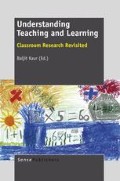Abstract
In commenting on future directions in Australian Indigenous education, I suggest that if classroom research focuses solely on strategies that a teacher might use to bring about effective learning outcomes, it will have little meaning for Indigenous students unless it also takes into account the cultural and historical realities of race relations and their aftermath. Experience in Australia over the last 40 years has consistently demonstrated the futility of research focusing exclusively on student learning regimes or teacher practice.
Access this chapter
Tax calculation will be finalised at checkout
Purchases are for personal use only
Preview
Unable to display preview. Download preview PDF.
References
Britzman D. Practice makes practice: A critical study of learning to teach. Albany: State University of New York Press; 2003.
Commonwealth of Australia. (2011). Closing the gap—Prime Minister’s Report 2011. Retrieved from http://www.fahcsia.gov.au/sa/indigenous/pubs/closing_the_gap/2011_ctg_pm_report/part_c/Pages/schooling.aspx.
Commonwealth Government. (2008). Australian Budget 2008–09. Retrieved from http://www.budget.gov.au/2008-09/content/ministerial_statements/html/indigenous-02.htm.
Cowlishaw G. Cultures of complaint: An ethnography of rural racial rivalry. Journal of Sociology. 2006;42(4):429–445.
Ellsworth E. Teaching positions: Difference, pedagogy, and the power of address. New York: Teachers Colleges Press; 1997.
Felman S. Jacques Lacan and the adventure of insight: Psychoanalysis in contemporary culture. Cambridge, MA: Harvard University Press; 1987.
Fink B. The Lacanian subject: Between language and jouissance. Princeton NJ: Princeton University Press; 1995.
Gillard, J. (2011). PM’s closing the gap speech on Indigenous Australia. The Australian, February 10. Retrieved from http://www.theaustralian.com.au/national-affairs/pms-closing-the-gap-speech-on-indigenous-australia-in-full/story-fn59niix-1226002750396.
Gillborn D. Racism and education: Coincidence or conspiracy? Abingdon: Routledge; 2008.
Graham LJ, Jahnukainen M. Wherefore art thou, inclusion? Analysing the development of inclusive education in New South Wales, Alberta and Finland. Journal of Education Policy. 2011;26(2):263–288.
Grek S, Ozga J. Re-inventing public education: The new role of knowledge in education policy making. Public Policy and Administration. 2010;25:251–270.
Haraway DJ. Simians, cyborgs, and women: The reinvention of nature. London: Free Association Books; 1991.
Harding S. The ‘racial’ economy of science: Toward a democratic future. Bloomington: Indiana University Press; 1993.
Harris, S. (1977). Milingimbi Aboriginal learning contexts. Unpublished doctoral dissertation, University of Mexico, Mexico City.
Harrison N. The learning is in-between: The search for a metalanguage in Indigenous education. Educational Philosophy and Theory. 2005;37(6):871–884.
Harrison N, Greenfield M. Relationship to place: Positioning Aboriginal knowledge and perspectives in classroom pedagogies. Critical Studies in Education. 2011;52(1):65–76.
Hayes D, Mills M, Christie P, Lingard B. Teachers and schooling making a difference: Productive pedagogies, assessment and performance. Crows Nest, NSW: Allen & Unwin; 2006.
Human Rights and Equal Opportunity Commission (1997). Bringing them home: Report of the National Inquiry into the Separation of Aboriginal and Torres Strait Islander Children from Their Families. Retrieved from http://www.hreoc.gov.au/social_justice/bth_report/report/appendices_9.html.
Lather P. Getting smart: Feminist research and pedagogy with/in the postmodern. New York: Routledge; 1991.
Malin M. The visibility and invisibility of Aboriginal students in an urban classroom. Australian Journal of Education. 1990;34(3):312–329.
Nicholls C. Radical hope: Correspondence. Quarterly Essay. 2009;36:93–102.
NSW Department of Education and Training. (2003). Quality Teaching. Retrieved from https://www.det.nsw.edu.au/proflearn/areas/qt/qt.htm.
Author information
Authors and Affiliations
Editor information
Rights and permissions
Copyright information
© 2012 Sense Publishers
About this chapter
Cite this chapter
Harrison, N. (2012). Commentary. In: Kaur, B. (eds) Understanding Teaching and Learning. SensePublishers, Rotterdam. https://doi.org/10.1007/978-94-6091-864-3_18
Download citation
DOI: https://doi.org/10.1007/978-94-6091-864-3_18
Publisher Name: SensePublishers, Rotterdam
Online ISBN: 978-94-6091-864-3
eBook Packages: Humanities, Social Sciences and LawEducation (R0)

